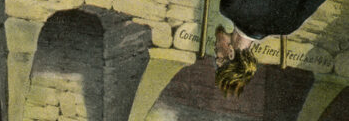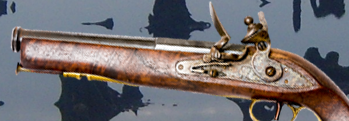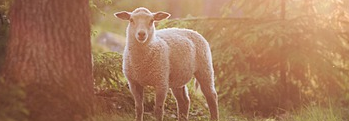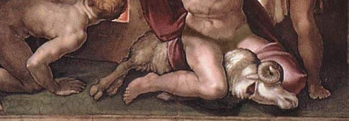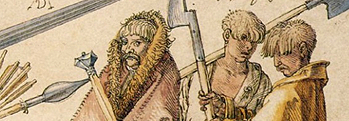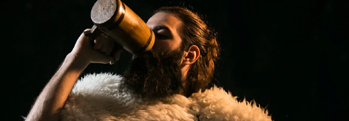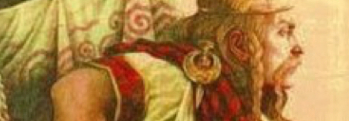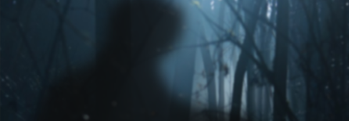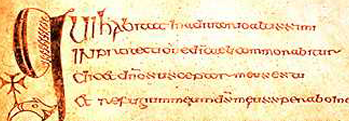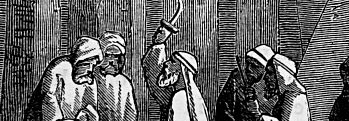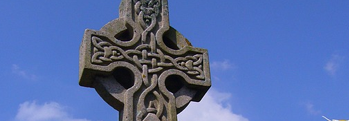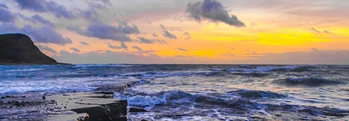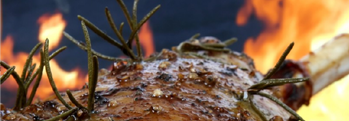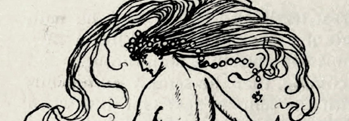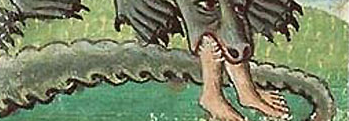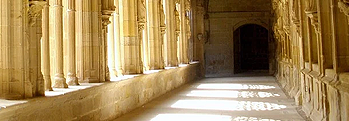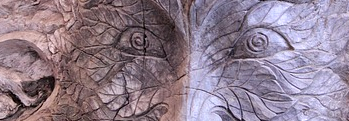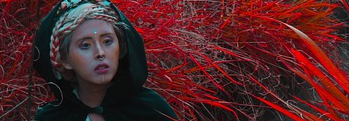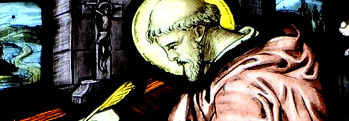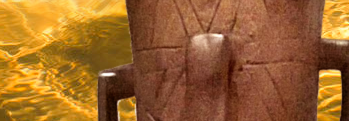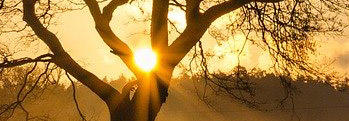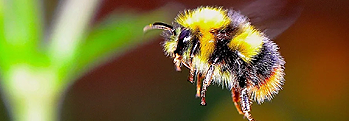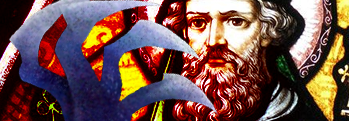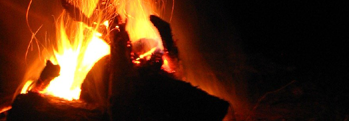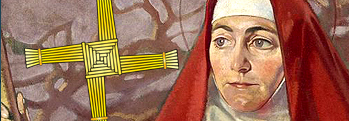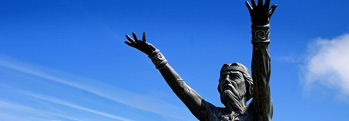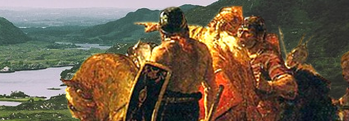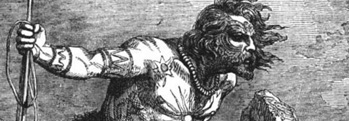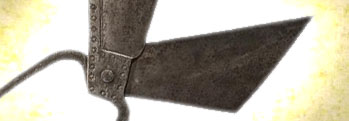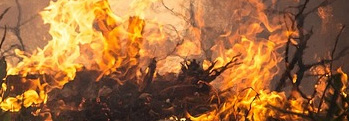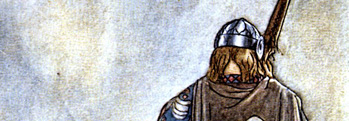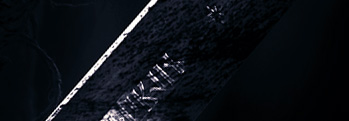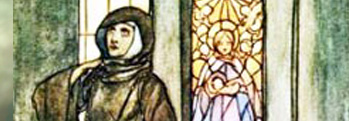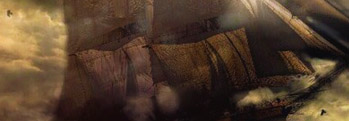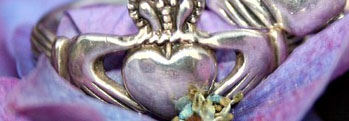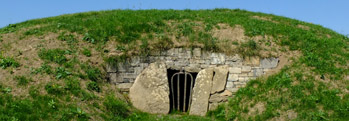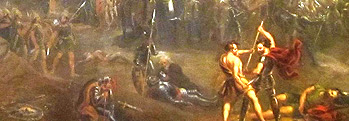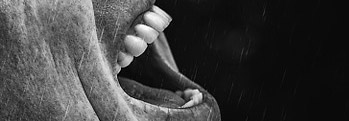King Cathal and the Gullet Demon
Irish and Celtic myths and legends, Irish folklore and Irish fairy tales from the Historical Cycle
If you are what you eat this man was half of Ireland
 This now is the true tale of mighty King Cathal Mac Finguine of Munster, lord of Cork and warrior without peer. In ancient Ireland this story was told when mead was first brought out, or a prince sat to his feast, or when an inheritance was taken, and the reward for reciting this story was a white-spotted, red-eared cow, a shirt of new linen, or a woollen cloak with its brooch.
This now is the true tale of mighty King Cathal Mac Finguine of Munster, lord of Cork and warrior without peer. In ancient Ireland this story was told when mead was first brought out, or a prince sat to his feast, or when an inheritance was taken, and the reward for reciting this story was a white-spotted, red-eared cow, a shirt of new linen, or a woollen cloak with its brooch.
Kings will always have enemies, which is why they say a throne is an uneasy seat, but those kings whose skill at arms and warfare became the subject of song were more feared than the other types. Such a king was Cathal Mac Finguine, who mastered all the southern half of Ireland and threatened the northern half too! No such king was afterwards known in Ireland until the rise of Brian Borúma, who defeated the Viking reaver-nations.
Well, the King of the North was called Maelduin, King of Ailech, and his rest had been troubled ever since the bodb-hags of his house and the house of Mac Finguine had duelled in verse at the border marches.
This was the song of the northern hag-spirit:
He comes from the North, comes from the North,
The son of Maelduin, over the rocks,
Over Barrow's brink, over Barrow's brink,
Till cattle he take he will not stay.
And the responding prophecy from the southern bodb was as follows:
He shall stay, shall stay
He will be thankful if he escapes.
By my father's hand, by my father's hand,
If Cathal meets him, he'll take no cattle.
Maelduin knew this boded ill for his family's fortunes, and perhaps spelled out the end of his line! He tossed and turned in sleepless turmoil, consulted mystics by moonlight and sent forth his spies and watchers to see if some way could be found to avert the fate. But in the end it was his own son, Fergal, who was named in the bodb-song, that found a way to strike at this impetuous southern king!
For he knew three things which nobody else did – he knew his sister Ligach well, and he knew she had a soft spot for King Cathal of Munster, that land once called Mumu, and he knew she liked to send Cathal exotic fruit, sweet pastries and delicious treats as an admirer from afar. Instead of contemplating how a union of houses might benefit them all however, Fergal bent his mind to making a sword of her sweetness.
Fergal summoned his sister and said to her that she must tell him the truth about her relationship with King Cathal, or he would lay his curse upon her. As much as she loved Cathal distantly she feared her brother's curse more, for he was known to consort with strange people and even the Druids, such as remained of them! So she confessed her innocent gifting, and Fergal bade her send the fruit to himself instead, and so she did.
Fergal summoned a man to him, although who he called isn't known – perhaps a sorcerer fleeing his rivals in the eastern crescent, or one of the old Druids, or a sidhe-hostage bound to count grains of sand or some other such eldritch worker of black wonders.
 Fergal promised him riches, land, wealth and women if he would put a charm for the undoing of his enemy and rival on the fruit and sweets, so the magician wove terrible enchantments into the fruit, spells learned from accursed tablets graven before the drowning of the world that was.
Fergal promised him riches, land, wealth and women if he would put a charm for the undoing of his enemy and rival on the fruit and sweets, so the magician wove terrible enchantments into the fruit, spells learned from accursed tablets graven before the drowning of the world that was.
Fergal sent messengers to Cathal with these delicious treats in a basket, and the messengers said they had been sent in love and affection by the beautiful Ligach, daughter of Maelduin. By each of the eight universal things, sun and moon, dew and sea, heaven and earth, day and night, they prayed that he would eat those fruits.
It was an easy sale, for Cathal had admired the beauty of Ligach for a while, and quickly he ate the apples and plums, the pears and tarts, declaring himself well satisfied with the repast!
But little creatures through the poisonous spells were quickly formed in his stomach and throat, and those little creatures gathered in a womb of their own making, so that a demon of gluttony formed!
And from that day onwards for the next three half-years this demon lived in the throat of Cathal Mac Finguine, to the ruin of the men of Munster, for nothing he ate would satisfy him, and he ate everything that could be eaten while never gaining a feather's weight!
Each day a pig and a cow and a bullcalf of three hands, with three score cakes of pure wheat and a vat of new ale, and thirty heath-poults' eggs comprised his starter, besides another snack, until his great feast was ready for him. As for the great feast, that passed account or reckoning.
Now it happened at that time there were eight wise and crafty people in Armagh, reclusive masters whose names were sung without cheer by the bards of the time:
I have heard of eight tonight
In Armagh after midnight
I proclaim them with hosts of deeds,
Their names are no sweet symphonies.
Comgan was the name of the Two Smiths' son
Famous was he after the hunt.
Critan was Rustang's noble son,
It was a full fitting name.
The Two Tribes' Dark One, a shining cry,
That was the name of Stelene's son.
Dun Raven, a white nun, of Beare
Rough Derry was the name of Saman's son.
Never-Refused was Mac Conglinne's name,
From the brink of the sweet-crested Bann.
Wee Man, Wee Wife, bag of carnage,
Were Dead Man's sire and dam.
Anier Mac Conglinne was one of those famed scholars, rich in lore and wide in knowledge, but truth be told he was finding dusty books and the wisdom of his forefathers to be a bit less compelling than he had originally imagined. His name meant “he who is hard to refuse” on account of his mastery of satire and praise, and he longed to begin a poet's journey to escape the shadow of his tiresome studies.
He spoke with a few travellers and merchants passing through Armagh and heard tell of the great King Cathal in Munster, who was holding a parade in Iveagh, and he decided that nowhere else would do. The scholar had heard that he would get plenty and enough of all kinds of white meat in Munster, for greedy and hungry for whitemeats was he.
Then he swapped his few possessions for two wheaten cakes and a slice of old bacon with a streak across its middle, which he put in his book satchel, and that very night made two pointed shoes of seven-folded dun leather for his journey.
He got up early the next day, wrapping himself warmly in his iron-brooched white cloak, then made a turn clockwise around the graveyard and waved farewell to his mentor who chanted gospels around him.
Anier made his way to Cork and came to the guest house of Cathal, which he found to be in a sorry state – the door had been left open and dust and ash had blown everywhere, the roof thatching was threadbare, and the rolled blanket was full of lice and fleas! The bathtub had the water of the night before in it, and the heating stones were cold by the doorpost.
 There was nobody to greet him or wash his feet, as was the custom of the day, and so he washed his own feet in the bathtub and tried to get some rest, but truly, as numerous as the sand of the sea or the sparks of fire were the lice and fleas nibbling his legs, so that weariness seized him without rest.
There was nobody to greet him or wash his feet, as was the custom of the day, and so he washed his own feet in the bathtub and tried to get some rest, but truly, as numerous as the sand of the sea or the sparks of fire were the lice and fleas nibbling his legs, so that weariness seized him without rest.
He rolled out of bed, scratching himself, and took down his book of psalms, whereupon he began singing in his rich and melodious voice. His voice was heard a thousand paces outside of Cork city, and nobody in Cork got a wink of sleep that night.
“Is there someone in the guest house?” asked Manchin, who was the Abbot of Cork, rubbing his eyes.
“Nobody that I know of,” said his attendant, but another said he had seen someone hurrying past earlier.
“Well, if he's too lazy to come and get it, you'd better bring him his allowance,” said the Abbot, and the attendant went to the guest house with a small cup of the church whey-water, two sparks of fire in the middle of a wisp of oaten straw, and two sods of damp, fresh peat.
The attendants came to the guest house and terror seized him, for it was dark within the gaping door. They called to see was anyone within, and Anier responded that there was.
“We couldn't clean the house up for just the one man,” they said by way of excuse, “for it would break the spells laid on the place!”
“If ever the spells on it were broken,” said Anier, “they were tonight, for their breaking was fated, and it is I who break them. But I will not rise until you tell me what ration you bring me!”
So the attendants took out the wet peat and the sparks glinting in the wisps of straw, and laid his cup of whey water before him. Upon seeing this miserly portion, Anier drew himself up and recited a satirical poem about the welcoming ways of Cork and its miserable hospitality, and the attendants fled with their ears burning.
When Manchin the Abbot heard the vicious yet oddly catchy poem that Anier had been inspired to compose on the spot, he told the others that children and dogs in the street would be singing it unless its composer was punished immediately, and he wasn't far wrong! The reputation of the Abbot and the city itself would be ruined.
Well, he turned to his men and told them “to go to the person who made that poem, to strip him of all his clothes, to lay scourges and horsewhips on him until his flesh and skin break and sever from his bones, only let his bones not be broken. Then put him in the Lee river and give him his fill of the muddy water of the Lee. Then let him be put into the guest house, without a stitch of clothing.”
“There let him sleep that night, in the most wretched and darkest plight he ever was in. Let the house be closed on him from outside until morning, in order that he may not escape, until my counsel together with the counsel of the monks of Cork shall be held. And our counsel shall be no other than his crucifixion tomorrow, for the honour of myself and of Saint Barre, and of the Church!”
What Saint Barre would have thought of this carry on is anyone's guess, but his men nodded and went about their business as instructed, until the next morning when Anier was taken out of the guest house and brought before the monks of Cork. Besides their mistreatment of him, he had been plagued by strange visions and surreal dreams all night.
A great argument commenced and not for nothing was Anier called “hard to refuse” because before too long the monks were having the worst of it, and his blazing rhetoric lit their cheeks up red! But it began to come out that besides being a mean hand with the rations, the Abbot was also short of food to give, since the King was eating it all.
At this, Anier realised the meaning of the visions he had experienced the previous night meant, and he held up his hand to call a halt to the proceedings.
“Do you mind,” said he, “if I am allowed to say a few short words, for a vision appeared to me last, night,” said Anier, “and, if a respite is given me, I will relate the vision.”
“I say,” declared Abbot Manchin, “if all of humanity were asked, they would not give you respite even for a minute, and neither will I.”
His monks were curious though. “We pledge our word,” said the monks, “though it be disagreeable to you, Manchin, he shall have a respite, that he may tell us his vision. Inflict on him afterwards whatever you wish.”
Anier began to recount his vision, as he said:
“A vision that appeared to me,
An apparition wonderful I tell to all:
A lardy coracle all of lard
Within a port of New-milk Loch,
Upon the world's smooth sea.
We went into the man-of-war,
'Twas warrior-like to take the road
O'er ocean's heaving waves.
Our oar-strokes then we pulled
Across the level sea,
Throwing the sea's harvest up,
Like honey, the sea-soil.
The fort we reached was beautiful,
With outworks of custards thick,
Beyond the loch.
New butter was the bridge in front,
The rubble dyke was wheaten white,
Bacon the palisade.
Stately, pleasantly it sat,
A compact house and strong.
Then I went in:
The door of it was dry meat,
The threshold was bare bread,
Cheese-curds the sides.
Smooth pillars of old cheese,
And sappy bacon props
Alternate ranged;
Fine beams of mellow cream
White rafters-real curds,
Kept up the house.
Behind was a wine well,
Beer and bragget in streams,
Each full pool to the taste.
Malt in a smooth wavy sea,
Over a lard-spring's brink
Flowed through the floor.
A loch of pottage fat
Under a cream of oozy lard
Lay 'tween it and the sea.
Hedges of butter fenced it round,
Under a blossom of white-mantling lard
Around the wall outside.
A row of fragrant apple-trees,
An orchard in its pink-tipped bloom,
Between it and the hill.
A forest tall of real leeks,
Of onions and of carrots, stood
Behind the house.
Within, a household generous,
A welcome of red, firm-fed men,
Around the fire.
Seven bead-strings and necklets seven,
Of cheeses and of bits of tripe,
Hung from each neck.
The Chief in mantle of beefy fat
Beside his noble wife and fair
I then beheld.
Below the lofty cauldron's spit
Then the Dispenser I beheld,
His fleshfork on his back.
The good Cathal Mac Finguine,
He is a good man to enjoy
Tales tall and fine.
That is a business for an hour,
And full of delight 'tis to tell
The rowing of the man-of-war
O'er Loch Milk's sea.”
“Fine, you wretch,” said Abbot Manchin in disappointment, “go straight to King Cathal and tell the vision to him, for it was revealed to me last night in my dreams that this evil which afflicts Cathal would be cured through that very vision.”
“What reward shall I have?” asked Anier.
“Isn't the reward of keeping your body and soul together enough for you?” said Manchin.
“I don't care about that,” said Anier, “Heaven awaits me with open arms, although I'm not so sure about you!”
“What reward do you want?” asked the monks of Cork.
“Not great indeed is what I ask,” said Anier, “merely a little cloak, that is, Manchin's cloak!”
Manchin was very displeased to hear that, for the cloak was a sign of his office, and by giving it up he would be making Anier the new Abbot!
“Maybe little to you,” muttered Abbot Manchin, “I would sooner give you all of Cork, if it were mine!” but again the monks shouted him down and he sullenly agreed, saying only that he would give the cloak to the Bishop, and if Anier succeeded, he could look for it there.
They told him that King Cathal was visiting with Prince Pichan son of Maelfinn, and to get out of their sight as quick as he could.
So Anier packed his few belongings again and went as quickly as he could to meet King Cathal. Entering into the stronghold of Pichan he began acting the fool, passing gas and singing songs, juggling rocks and dancing very strangely.
Prince Pichan came to him and said he was not amused, and Anier asked him why that might be.
 “Haven't you heard, oh scholar of foolishness, that King Cathal is coming tonight, and although his great army will prove to be a burden, more troublesome is the man himself! And though troublesome will be his first meal, more troublesome is his main feast, but most troublesome of all is the feast after that! There will be no food left in all my lands.”
“Haven't you heard, oh scholar of foolishness, that King Cathal is coming tonight, and although his great army will prove to be a burden, more troublesome is the man himself! And though troublesome will be his first meal, more troublesome is his main feast, but most troublesome of all is the feast after that! There will be no food left in all my lands.”
“What reward will I earn,” said Anier, “if I can protect you from now to the same hour tomorrow, and you will suffer no vengeance from Cathal for it?”
“I would give you a golden ring and a Welsh steed,” said Pichan.
“Not bad, but I feel you can do a little better,” said Anier.
“I will give you besides,” said Pichan, “a white sheep for every house and field in my land.”
“That will do,” replied Anier, “just so long as I also get the agreement of the poets of Cork to scathe and revile you if I am cheated of my dues, and satirists to scatter the satires, and sing them against you and your children and your race, unless my dues reach me.” To this Pichan agreed, for the alternative was ruin.
Well it didn't take long for Cathal to arrive with his great army, and they sat themselves down on blankets and bedrolls to be served by gentle maidens. But King Cathal didn't even have his shoes off before he was going at the apples piled on hides around him, using both hands!
Anier watched from the corner of his eye and began smacking his lips from across the room, but Cathal did not notice. Anier then rose and went hastily like the fiend in a furious rush and warlike stride across the royal hall. He came to a huge block and war-stone on which spears and rivets were usually fastened, and against which edges were sharpened.
He lifted it on his back and carried it back to where he had been sitting, stuck the upper end of it in his mouth, and began grinding his teeth against the stone! And I'll tell you there was no one in or around the hall that didn't hear the noise of his teeth against the stone.
At last Cathal raised his head, saying “What has gotten into your head, son of learning?”
“A couple of things,” said Anier, “first is to see Cathal, the right-beautiful son of Finguine, the high-king of the great Southern Half, the chief defender of Ireland against the children of Conn the Hundred Fighter, a man ordained of God and the elements, the noble wellborn hero of pleasant Onaght of Glenowra eating alone, and if any from distant parts were to see my beard not wagging along with your own, what a mockery they would make!”
Cathal's heart was moved by this sweet persuasion, and although for the space of three half-years that the fiend had lived in his throat, he had not performed such an act of humanity as the giving of one wild apple to Anier, he threw him an apple now.
“Better to learn two things than one,” said Anier, and was given another.
“The number of the Trinity!” and got another.
“The four books of the Gospel, according to the Testament of Christ!” and he went on like this until a great pile of apples was gathered at his feet, and Cathal exclaimed in exasperation.
“You'll eat me if you keep going!” he shouted, flinging the hide, apples and all, so they went all over the place, but wherever they went, they were closer to Anier than to Cathal.
Fury seized Cathal then and one of his eyes fell so far back into his head that a river crane couldn't have picked it out. The other eye bulged out until it was as large in his head as a hen's egg! He leaned back against the side of the palace and the rafters, poles, wattles and thatch shook before his wrath, but he controlled his fury and sat himself down.
“Why do you act so, man of learning?” asked Cathal.
“Well truth be told I had a quarrel with the monks of Cork,” replied Anier, “and they said to me there was no way you would spare a morsel, let alone hold a holy fast with me this night!”
Aghast and taken between pride and outrage, Cathal threw up his hands and with immense internal struggle said that he could and would prove those monks wrong, although he'd rather give them all the cattle in Cork. That night the two men fasted but Anier awoke early and went to tell Prince Pichan to fry bacon and onions and all sorts of savoury foods outside the window where the king was sleeping.
The prince did so, and the king awoke with hunger in his eyes, but before he could move a muscle, Anier declared it was time for the morning sermon! Groaning and close to slavering, the king settled down and waited while Anier exercised all of his rhetorical skill and eloquence to deliver a sermon that had one and all in showers of tears.
“And now,” said the king, “let us eat!”
“In but a moment oh regal King Cathal,” demurred Anier, “I have heard your high skill is the interpretation of dreams! I had a rare vision last night, surely sent by God, and with no doubt great importance for the future of Munster. Could you interpret it for me?”
“Perhaps later - “ began Cathal, but it was too late, for Anier had already begun.
“A vision I beheld last night:
I sallied forth with two or three,
When I saw a fair and well-filled house,
In which there was great store of food.
A lake of new milk I beheld
In the midst of a fair plain.
I saw a well-appointed house
Thatched with butter.
As I went all around it
To view its arrangement,
Puddings fresh-boiled
They were its thatch-rods.
Its two soft door-posts of custard,
Its dais of curds and butter,
Beds of glorious lard,
Many shields of thin pressed cheese
Under the straps of those shields
Were men of soft sweet smooth cheese,
Men who knew not to wound a Gael,
Spears of old butter had each of them.
A huge cauldron full of meat
(Methought I'd try to tackle it)
Boiled, leafy kale, browny-white,
Brimming vessel full of milk.
Bacon house of two-score ribs,
Wattling of tripe-support of clans
Of every food pleasant to man,
Meseemed the whole was gathered there.”
And he said further
“A vision I beheld last night,
'Twas a fair spell,
'Twas a power of strength when to me appeared
The kingship of Erin.
I saw a court-yard topped with trees,
A bacon palisade,
A bristling rubble dyke of stone
Of pregnant cheeses.
Of chitterlings of pip were made
Its beautiful rafters
Splendid the beams and the pillars,
Of marvellous pork.
Marvellous the vision that appeared to me
By my fireside:
A butter draught-board with its men,
Smooth, speckled, peaked.
God bless the words I utter,
A feast without fatigue!
When I got to Butter-mount,
A gillie would take off my show?”
At this description of delicious food of all sorts, Cathal's mouth began to hang slack, and he moaned without word, but Anier was far from done!
“And then in my dream there came to me a Sidhe,” he said “and I asked its name –
Wheatlet son of Milklet,
Son of juicy Bacon,
Is mine own name,
Honeyed Butter-roll
Is the man's name
That bears my bag.
Haunch of Mutton
Is my dog's name,
Of lovely leaps.
Lard, my wife,
Sweetly smiles
Across the kale-top.
Cheese Curds, my daughter,
Goes round the spit,
Fair is her fame.
Corned Beef, my son,
Whose mantle shines
Over a big tail.
Savour of Savours
Is the name of my wife's maid:
Morning-early
Across New-milk Lake she went.
Beef-lard, my steed
An excellent stallion,
That increases studs;
A guard against toil
Is the saddle of cheese
On his back.
When a cheese-stead is sent after him,
Rapid his course,
Fat is on his ribs,
Exceeding all shapes.
A large necklace of delicious cheese-curds
Around his back
His halter and his traces all
Of fresh butter
His bridle with its reins of fat lace.
The horsecloth of tripe with its sausage
Tripes are in its hooves.”
Anier carried on and on in this manner until the King's head lolled forward as one hypnotised, and around them gathered an audience of many of the Dún's inhabitants, enraptured by the verbal feast laid out before them.
But suddenly Anier leaped to his feet and told the Prince and all his men to lay hands on Cathal and bind him swiftly to the wall, and so they did, not knowing what they were at themselves. Quicker yet, Anier leaned outside the window with his fork in his hand and stabbed a piece of bacon, carrying it back inside before Cathal's face.
“What do you do, scholar? How long will you carry this on?” said Cathal, “carve the food for us, son of learning!”
“Certainly,” said Anier, and dipping the bacon into a dish of salted honey he waved it under the kings nose and put it in his own mouth. He did this again, and then he did it a third time, until Cathal roared and bellowed, and commanded the killing of the scholar. But that was not done for him.
With the king's enraged shouting and at the pleasure of the description of those many various pleasant viands by Anier, the lawless beast that dwelt in the inner bowels of Cathal Mac Finguine came forth, until it was licking its lips outside his head!
Anier again leaned out the window to where the food still cooked and took pieces of delicious pork and chicken, bringing them one after the other to the lips of the king, before finally putting a piece in the king's mouth.
 At that the son of malediction darted forth, fixed his two claws in the piece that was in Anier's hand, and climbing out of the king carried it into an empty cauldron that was on the other side of the fire. Swift as a striking wolf, Anier overturned the cauldron on the demon, which is how it got its name, “lonchoire,” from the demon “lon” of gluttony that was in Cathal's throat, being under the cauldron “coire”.
At that the son of malediction darted forth, fixed his two claws in the piece that was in Anier's hand, and climbing out of the king carried it into an empty cauldron that was on the other side of the fire. Swift as a striking wolf, Anier overturned the cauldron on the demon, which is how it got its name, “lonchoire,” from the demon “lon” of gluttony that was in Cathal's throat, being under the cauldron “coire”.
“To God and Bridget we give thanks,” said Anier, clapping his right palm over his own mouth, and his left palm over the mouth of Cathal, before linen sheets were put round Cathal's head and he was carried out.
“What is most necessary for us to do now?” asked Pichan.
“The easiest thing in the world,” said Anier, “let the army, then men and women, the chiefs and nobles, the herds, flocks and cattle all be taken quickly from the fortress, along with everything else of value except only that cauldron.” And so it was done.
Then the hall was then shut from the outside, and four huge fires were kindled here and there within. When the house was a tower of red flame and a huge blaze, the demon sprang to the rooftree above the conflagration, for the fire was powerless to do anything to him, and he sat on the hall amid the flames.
“Well, now you men of Munster,” said Anier, “yonder is the cause of all your troubles. Shut your mouths that I may speak with that unworshipful wretch,” he shouted, “bow to us!”
“And indeed I will,” said the devil, “I cannot help it, for you are a man with the grace of God, with an abundance of wisdom, acuteness of intellect, intense humility, the desire of every goodness, and with the grace of the seven-fold Spirit. I am a demon by nature, of infrangible substance, and I shall tell you my story.”
“I have been three half-years in Cathal's mouth, to the ruin of Munster and the Southern half of Ireland besides, and if I were to continue three half-years more, I would ruin all Ireland.”
“Were it not for the nobleness of the monks of great Cork of Munster, and for their wisdom, for their purity and for their honesty, and for the multitude of their bishops and their confessors, from whom you have come against me, and were it not for the worth of the voice and the word, honour and soul of the noble venerable king, whom you have come to save, and again, were it not for your own nobility and worth, and purity and wisdom, and abundance of knowledge and lore - it is into your own throat I would go, so that they would lash you with dog-straps and scourges and horsewhips through all Ireland, and the disease that would kill you would be hunger.”
“The sign of the Lord's cross between me and thee,” said Anier Mac Conglinne, thrice threatening him with the Gospels.
And the demon continued “Given half a chance I would bear your body into the earth and your soul into hell before long tonight,” and he flew into the air among the tribes of hell, never to bother anyone again.
Heaving a great sigh of relief, Anier bade Prince Pichan feed the king a mixture of fresh milk, butter and honey, and Cathal fell into a deep sleep. Musicians and players entertained him from noon until twilight as he slumbered, and great respect and honour had they that night for the scholar.
The King was three days and three nights in that one sleep, and he awoke haggard but whole, and Anier received in full his reward, and the Abbot's little cloak too.
Cork can be found on the map below!
More Tales from the Historical Cycle
The gift of the gab, as it’s known, is a common thing among the Irish – being able to talk all day about anything and everything, and do it in a way that would have you listen as well. It’s as Irish as red hair and freckles. But what if you didn’t have the gift of the gab, or felt a deficiency of gabbiness? Never fear, al ... [more]
Ireland is full of strange little corners and odd byways that only a few know about, and one such is a mysterious place called the Gearagh, or An Gaorthadh, meaning the wooded river bed, in County Cork. Once it was part of the first forests in Ireland, home to verdant giants that grew after the great ice melted away, but now all that remains is a s ... [more]
Ireland at the beginning of the first millenium was a turbulent place, with many clans and kingdoms fighting among themselves, so that a Lord might be sitting comfortably one day but find himself fleeing for his life the next! And so it was with one of the greatest of Ireland's kings, Cormac Mac Art. Although he was by blood, law and custom ... [more]
On Martinmas eve, that is to say the 10th of November, it used to be the custom in many parts of Ireland to sacrifice an animal to Saint Martin of Tours! This tradition has only recently ceased, having been carried on well into living memory, as lately as the 1940s in some places. In poorer homes a goose, gander, duck or chicken was killed, whil ... [more]
It's true to say that music has a magic all to itself, for it can transport us to different places and times with the strumming of a few notes. It can make us feel angry, or sad, or happy, or any one of a myriad of other emotions. But if you were to hear the music of an occult Sidhe instrument played by one of the fairy folk under a loon's ... [more]
King Cormac Mac Airt was one of the mightiest kings of Ireland, known and well known for his wisdom, but after he lost an eye in a battle with the Déisi, he had to step down, for the solemn law was that a king must be without blemish. His son Cairbre came to him to ask his advice before in turn being crowned king. “O Cormac, grandso ... [more]
"Crom Cruach and his sub-gods twelve," Said Cormac "are but carven treene; The axe that made them, haft or helve, Had worthier of our worship been. "But He who made the tree to grow, And hid in earth the iron-stone, And made the man with mind to know The axe's use, is God alone." Anon to priests of Crom was ... [more]
Most people with an interest in Irish mythology and legends will have heard of the great tale of the Táin Bó Cúailnge, which tells of the heroic deeds of Cú Chulainn as he resisted and gave battle single handed to the armies of Queen Medb. What most don't know is that the ancient tale was once all but lost, for th ... [more]
One of the most legended and powerful relics of ancient Ireland was the Cathach, or battle-book of St Colmcille, who was also known as St Columba. A Cathach was really any sort of sacred or magical artifact, and great was the strife between the tribes and clans of Ireland to gain ownership of them! The psalter or prayer book of Saint Colmcille w ... [more]
Three was a sacred number to the people of ancient Ireland, bearing with it a hint of magic and the sacred, and this belief carried through to their spiritual practices, which occasionally included human sacrifice! Most cultures throughout history have at one point or another practised some form of human sacrifice, and lurid tales passed down fr ... [more]
Saint Colman was a famous Saint in early Irish Christianity, being born a prince not long after Saint Patrick brought the faith to Ireland in the first place. Despite his royal lineage however, his birth was no easy matter, for the druids had prophecised darkly that he would be a great man and surpass all others of his clan! His pregnant mother ... [more]
The old pagan times in Ireland were fraught with peril for even the mightiest warriors, with chieftains and tribes going to war often and for many reasons – pride, hatred, love and greed! And so it was with the fierce King Conall Collomrach. Little is known of his exploits, but his reign was brief and his end was violent, leaving behind only ... [more]
This now is the true tale of mighty King Cathal Mac Finguine of Munster, lord of Cork and warrior without peer. In ancient Ireland this story was told when mead was first brought out, or a prince sat to his feast, or when an inheritance was taken, and the reward for reciting this story was a white-spotted, red-eared cow, a shirt of new linen, or a ... [more]
The river in Meath which we today know as the Delvin, that very same river which flows into the Irish sea in Gormanstown, was not always called so. In the time of Kings it was called Inbher Oillbine, and this is the grim story of how it got that name. There was a prince who lived near to the mouth of the river, and his name was Ruadh Mac Righdui ... [more]
The boy who was to be Saint Colman was born in the northern kingdom of Dalriada, which held both Northern Ireland and Scotland in its power at the start of the sixth century. This was the time of the dawn of Christianity in Ireland, and it was a time when great terrors and monsters from primordial epochs still swam in the deep lakes and lazy rivers ... [more]
Most people have heard of Ireland's famous title, “The Island of Saints and Scholars”, and the reason it was so well known was because of the many fine Irish Catholic universities and colleges that preserved and spread learning throughout Europe. Of them all, there were few finer than the one in Howth, and so wonderful was its reput ... [more]
Very often here in Ireland we walk past the most astonishing buildings, carven stone high crosses, ancient temples and many similar things, but rarely do we wonder who built them. Well as it turns out, legend has it that a surprising number of them were built by a man called Gobán Saor, whose name means “Gobán the Builder,&rdquo ... [more]
I. Once upon a time there was a High King in Ireland by the name of Conn the hundred-fighter, for so many battles had he fought and won to gain his kingship. At the end of his reign was Fionn Mac Cumhaill born. Long was Conn's lineage, although I won't trouble you with the details, but he reigned at Tara of the Kings as Lord of all Irela ... [more]
In the time of High King Lugaid Luaigne, that is around the age when Fionn Mac Cumhaill and his Fianna fought in defence of the great land of Ireland, a dispute arose in the northern Kingdom among the men of the Ulaid, for instead of there being only one king of Ulster, there were two! Well, as anyone who knows anything about kings will tell you ... [more]
St Colmcille is one of the three patron saints of Ireland, and his life is the subject of story and legend. It was by his efforts that Christianity spread not only through Ireland but also Scotland, England and parts of Europe too! He was a tall and powerfully built man with a rich and melodious voice which, it was said, could be heard from one hil ... [more]
From the earliest times and in every corner of the world, mead was held in reverence. This sweet tasting fermented honey drink was especially loved by the ancient Irish, who shared fireside stories about rivers of mead in mystical lands over the edge of the ocean's horizon, ruled by Mannanan Mac Lír, and even in the place where the dead ... [more]
Ancient are the hills and mountains of Ireland, and ancient are her trees, something that the old people who lived here knew well. To them a tree was a mystical thing with its roots reaching down into the underworld of the sidhe mounds, and its branches lifting up high into the heavens towards the sun, moon and stars. Well over ten thousand places ... [more]
The Irish bee has been a beloved part of the culture and folklore as long as there have been people in Ireland, producing honey for cakes and mead as well as beeswax which has no end of uses. Many's the warm summer evening has been filled with their gentle humming above the beautiful flowers they help to pollinate. And yet for all that, old ... [more]
As Saint Patrick travelled across Ireland, spreading Christianity and the light among the pagan tribes, he saw many wonders and defeated many evils, but always more rose up to challenge him. So he took himself to prayer and saw a vision that he should travel to Croagh Patrick – although it was not so known at that time – and spend the L ... [more]
The shifting shadows of pagan times held sway over Ireland when the High King was a man known as Laoghaire, famed for his merciless fury and great strength, and he sat upon the seat of the High Kings in Tara. But unknown to him, Saint Patrick had landed in a little boat at Colpe in the Boyne estuary, travelling to a place called Ferta fer Feic, or ... [more]
One of the three patron Saints of Ireland, along with Patrick and Colmcille, St Brigid of Kildare was a devout Catholic in the very first days of the faith in Ireland. Her feast day is the first of February, which previously had been the pagan festival of Imbolc, halfway between winter and spring. Brigid herself was the daughter of a baptised Ch ... [more]
Through many an ancient legend and tale rings the name of the fierce and powerful druid called Mogh Ruith, meaning “slave of the wheel”. Older legends make him out to be the king of the Fir Bolg, or a druid gifted with many lives by the fairies, or that the name was but a title passed down through generations. Some say he had one eye ... [more]
Ireland has had many high kings, some were wise and kind and others cruel and the holders of grudges, but there were few as great as High King Cormac Mac Art, grandson of Conn of the Hundred Battles and son of Art and Ectach, the daughter of a mighty blacksmith. In his youth he stayed at the hall of the king of the north, Fergus Dubhdedach, but ... [more]
Back in the days of old Ireland when legends walked the earth, before the light drove back the shadows of ancient aeons, the word of a bard was much feared, for the people had no writing, so all of their culture and histories were held in songs and poems by bardic masters. As you can imagine even the mightiest were wary of getting on the wrong s ... [more]
In ancient days there was an Irish King whose name was Labraid Lioseach, known also as Labraid the Sailor for a long voyage he took into fairy seas, and when he came back from that voyage he was never seen without a deep hood over his head, except by one man. That man saw him once a year to trim his hair, and after the King's hair was cut, t ... [more]
It was the custom in Ireland of old to lay geases upon champions, heroes and warriors. These were magical forbiddings, deeds they must not do or disaster would follow, and no disaster fell so hard upon a man who broke his geases as upon Conaire Mor! His mother was a woman of the Sidhe called Etain, who had been married to King Eochaid, but disco ... [more]
Tierna the Historian was one of the many chroniclers and monks who wrote the tales of ancient Irish legends, telling us of strange and notable events in the almost forgotten past, the deeds of heroes and kings, and in one case, the disappearance of the High king himself! For it was by Tierna's hand we know that High King Cormac went missing for ... [more]
In the time between the Tuatha Princes and St Patrick, there rose over the people of Ireland mighty High Kings, who held power by force of arms, wit and wisdom. One of the greatest among them was Cormac of the wide purple cloak, whose hair was as golden as the heavy torc around his neck, with teeth like a shower of pearls and skin as fair as snow. ... [more]
Long ago when the fierce Milesians invaded Ireland and defeated the De Danann after many wars and battles, despite their sorceries and all their courage, skill and sciences, the folk of Danann made for themselves eldritch amulets and charms by which they and all their possessions became invisible to mortals, and so they continued to lead their old ... [more]
The Tailteann games were a grand affair in Ireland once upon a time, every bit as celebrated and renowned as the Olympics are today. Having their roots thousands of years earlier, in the time of the Tuatha Dé Danann, lakes were made and gigantic fires were lit during Lughnasadh, the summer feast in July. Druids and poets would compose cea ... [more]
The Claddagh Ring is one of those well known emblems of Ireland that most people recognise, but how many know the stories behind it? Many's the young man has gifted one to his lady, giving his heart along with it, as did the ring's original maker. Back in the seventeenth century there was a young Irish lad by the name of Richard Joyce, w ... [more]
Ah Tara, Temair of old, seat of more than a hundred High Kings of Ireland for better than a thousand years, home to the royal lines of Cormac and Tuathal, where is your wisdom and beauty? Where are the mighty warriors and poets who once danced in your halls? Why now do cattle and livestock graze where the mighty Fionn faced the Tuatha sidhe with a ... [more]
On Easter Sunday morning, in anno domine 433 it was that Patrick came face to face with the beating heart of the old religion at Tara, and did battle with the Druids. Although some might dispute the miraculous nature of the events that took place on that day, few argue they didn't happen, so take from that what you will! Laeghaire the king a ... [more]
Brian Boru was one of the greatest High Kings of all Ireland, a Christian king whose small dynasty challenged and broke even the power of the O'Neills, who had ruled Ireland from time immemorial. He rose to prominence at a time when the cruel Norseman was pillaging the lands of both Ireland and England, slaughtering and slave-taking, barbarians ... [more]
King Suibhne was master of the northern land of Dalriada in Ulster, and a grim and fierce king he was too, yet fair to behold like palest snow, with deep blue eyes. A mighty master at arms, he was called to war often, but latterly to the bloody battle of Moy Rath. As he readied himself he heard in the distance a church bell ringing, and no man of G ... [more]




